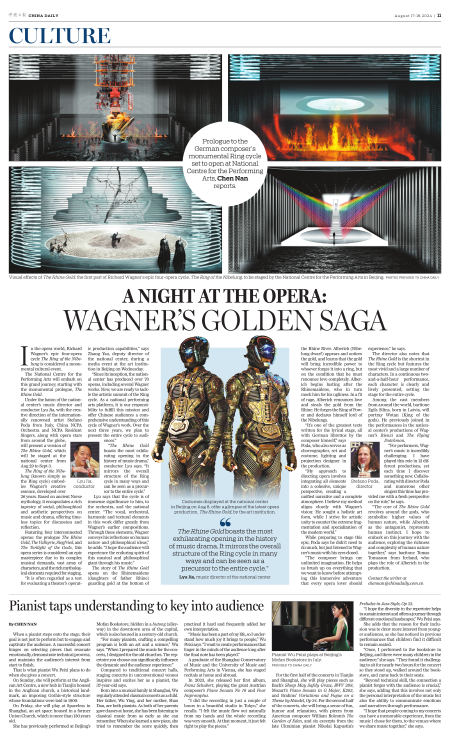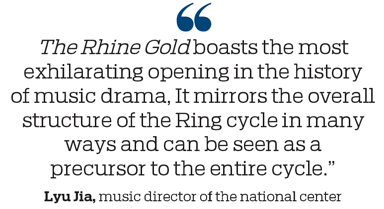

Lyu Jia, conductor

Stefano Poda, director
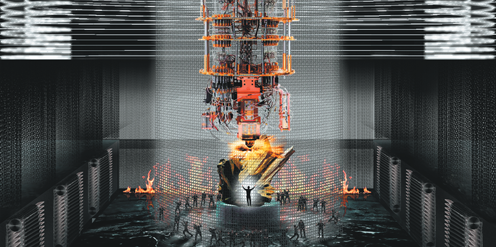
Visual effects of The Rhine Gold, the first part of Richard Wagner's epic four-opera cycle, The Ring of the Nibelung, to be staged by the National Centre for the Performing Arts in Beijing.
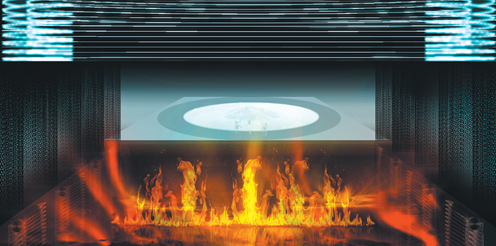
Visual effects of The Rhine Gold, the first part of Richard Wagner's epic four-opera cycle, The Ring of the Nibelung, to be staged by the National Centre for the Performing Arts in Beijing.
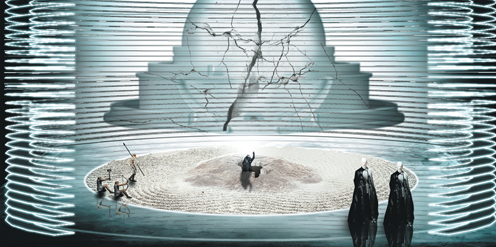
Visual effects of The Rhine Gold, the first part of Richard Wagner's epic four-opera cycle, The Ring of the Nibelung, to be staged by the National Centre for the Performing Arts in Beijing.

Visual effects of The Rhine Gold, the first part of Richard Wagner's epic four-opera cycle, The Ring of the Nibelung, to be staged by the National Centre for the Performing Arts in Beijing.
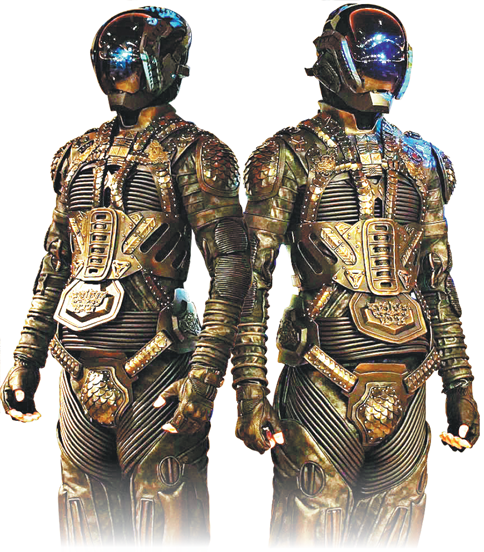
Costumes displayed at the national center in Beijing on Aug 8, offer a glimpse of the latest opera production, The Rhine Gold, by the art institution.
In the opera world, Richard Wagner's epic four-opera cycle The Ring of the Nibelung is considered a monumental cultural event.
The National Centre for the Performing Arts will embark on this grand journey, starting with the monumental prologue, The Rhine Gold.
Under the baton of the national center's music director and conductor Lyu Jia, with the creative direction of the internationally renowned artist Stefano Poda from Italy, China NCPA Orchestra and NCPA Resident Singers, along with opera stars from around the globe, will present a version of The Rhine Gold, which will be staged at the national center from Aug 29 to Sept 3.
The Ring of the Nibelung (known simply as the Ring cycle) embodies Wagner's creative essence, developed over 26 years. Based on ancient Norse mythology, it encapsulates a rich tapestry of social, philosophical and aesthetic perspectives on music and drama, offering timeless topics for discussion and reflection.
Featuring four interconnected operas: the prologue The Rhine Gold, The Valkyrie, Siegfried, and The Twilight of the Gods, this opera series is considered an epic masterpiece due to its complex musical demands, vast array of characters, and the rich mythological elements required for staging.
"It is often regarded as a test for evaluating a theater's operatic production capabilities," says Zhang Yao, deputy director of the national center, during a media event at the art institution in Beijing on Wednesday.
"Since its inception, the national center has produced over 70 operas, including several Wagner works. Now, we are ready to tackle the artistic summit of the Ring cycle. As a national performing arts platform, it is our responsibility to fulfill this mission and offer Chinese audiences a comprehensive understanding of this cycle of Wagner's work. Over the next three years, we plan to present the entire cycle to audiences."
"The Rhine Gold boasts the most exhilarating opening in the history of music drama," conductor Lyu says. "It mirrors the overall structure of the Ring cycle in many ways and can be seen as a precursor to the entire cycle."
Lyu says that the cycle is of immense significance to him, to the orchestra, and the national center. "The vocal, orchestral, harmonic and textural elements in this work differ greatly from Wagner's earlier compositions. Through these elements, Wagner conveys his reflections on human nature and philosophical ideas," he adds. "I hope the audience will experience the enduring spirit of this musical and philosophical giant through his music."
The story of The Rhine Gold opens on the Rhinemaidens (daughters of father Rhine) guarding gold at the bottom of the Rhine River. Alberich (Nibelung dwarf) appears and notices the gold, and learns that the gold will bring incredible power to whoever forges it into a ring, but on the condition that he must renounce love completely. Alberich begins lusting after the Rhinemaidens, who in turn mock him for his ugliness. In a fit of rage, Alberich renounces love and steals the gold from the Rhine. He forges the Ring of Power and declares himself lord of the Nibelungs.
"It's one of the greatest texts written for the lyrical stage, all with German librettos by the composer himself," says Poda, who also serves as choreographer, set and costume, lighting and projection designer in the production.
"My approach to directing opera involves integrating all elements into a cohesive, unique perspective, creating a unified narrative and a complete atmosphere. I believe my method aligns closely with Wagner's vision: He sought a holistic art form, while I strive for artistic unity to counter the extreme fragmentation and specialization of the modern world."
While preparing to stage this epic, Poda says he didn't need to do much, but just listened to Wagner's music with his eyes closed.
"The composer brings me unlimited imagination. He helps us brush up on everything that we want to know before attempting this immersive adventure that every opera lover should experience," he says.
The director also notes that The Rhine Gold is the shortest in the Ring cycle but features the most vivid and a large number of characters. In a continuous two-and-a-half-hour performance, each character is clearly and lively presented, setting the stage for the entire cycle.
Among the cast members from around the world, baritone Egils Silins, born in Latvia, will portray Wotan (King of the gods). He previously joined in the performances in the national center's productions of Wagner's Rienzi and The Flying Dutchman.
"For performers, Wagner's music is incredibly challenging. I have played this role in 12 different productions, yet each time I discover something new. Collaborating with director Poda and numerous other singers this time has provided me with a fresh perspective on the role," he says.
"The core of The Rhine Gold revolves around the gods, who symbolize higher values of human nature, while Alberich, as the antagonist, represents human instinct. I hope to embark on this journey with the audience, exploring the richness and complexity of human nature together," says baritone Tomas Tomasson from Iceland, who plays the role of Alberich in the production.
Contact the writer at chennan@chinadaily.com.cn
